Evaluating Health Promotion Education for Dementia Patients
VerifiedAdded on 2020/06/05
|11
|3367
|317
Report
AI Summary
This research proposal focuses on evaluating the importance of health promotion through education to promote healthy lifestyles for dementia patients and the general public, using an evidence-based approach for early detection and treatment. The introduction provides an overview of a clinical case involving a 55-year-old woman named Mavis, diagnosed with dementia, highlighting the need for early intervention and lifestyle adjustments. The literature review explores current knowledge and theories related to dementia, emphasizing the role of education in promoting healthy behaviors and early detection. The rationale of the research underscores the significance of the study in assessing existing knowledge and promoting healthy living for dementia patients. The methodology outlines the research strategy, approach, data collection methods, and limitations, including the use of qualitative data from interviews and surveys. The aim of the study is to assess the impact of health promotion through education on dementia patients. The proposal also addresses the significance of literature review and provides recommendations for improving the lifestyle of dementia patients.

Research Proposal
Paraphrase This Document
Need a fresh take? Get an instant paraphrase of this document with our AI Paraphraser
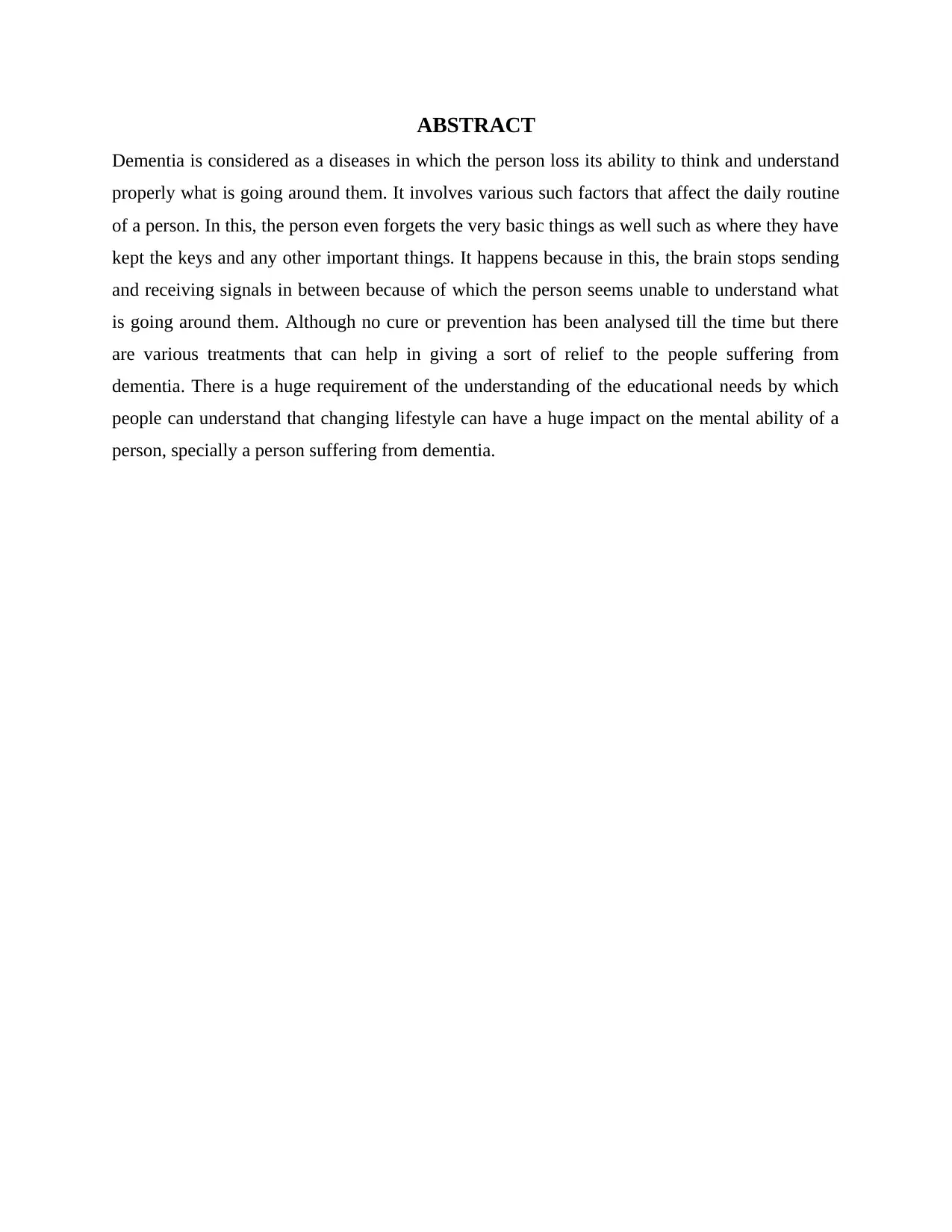
ABSTRACT
Dementia is considered as a diseases in which the person loss its ability to think and understand
properly what is going around them. It involves various such factors that affect the daily routine
of a person. In this, the person even forgets the very basic things as well such as where they have
kept the keys and any other important things. It happens because in this, the brain stops sending
and receiving signals in between because of which the person seems unable to understand what
is going around them. Although no cure or prevention has been analysed till the time but there
are various treatments that can help in giving a sort of relief to the people suffering from
dementia. There is a huge requirement of the understanding of the educational needs by which
people can understand that changing lifestyle can have a huge impact on the mental ability of a
person, specially a person suffering from dementia.
Dementia is considered as a diseases in which the person loss its ability to think and understand
properly what is going around them. It involves various such factors that affect the daily routine
of a person. In this, the person even forgets the very basic things as well such as where they have
kept the keys and any other important things. It happens because in this, the brain stops sending
and receiving signals in between because of which the person seems unable to understand what
is going around them. Although no cure or prevention has been analysed till the time but there
are various treatments that can help in giving a sort of relief to the people suffering from
dementia. There is a huge requirement of the understanding of the educational needs by which
people can understand that changing lifestyle can have a huge impact on the mental ability of a
person, specially a person suffering from dementia.
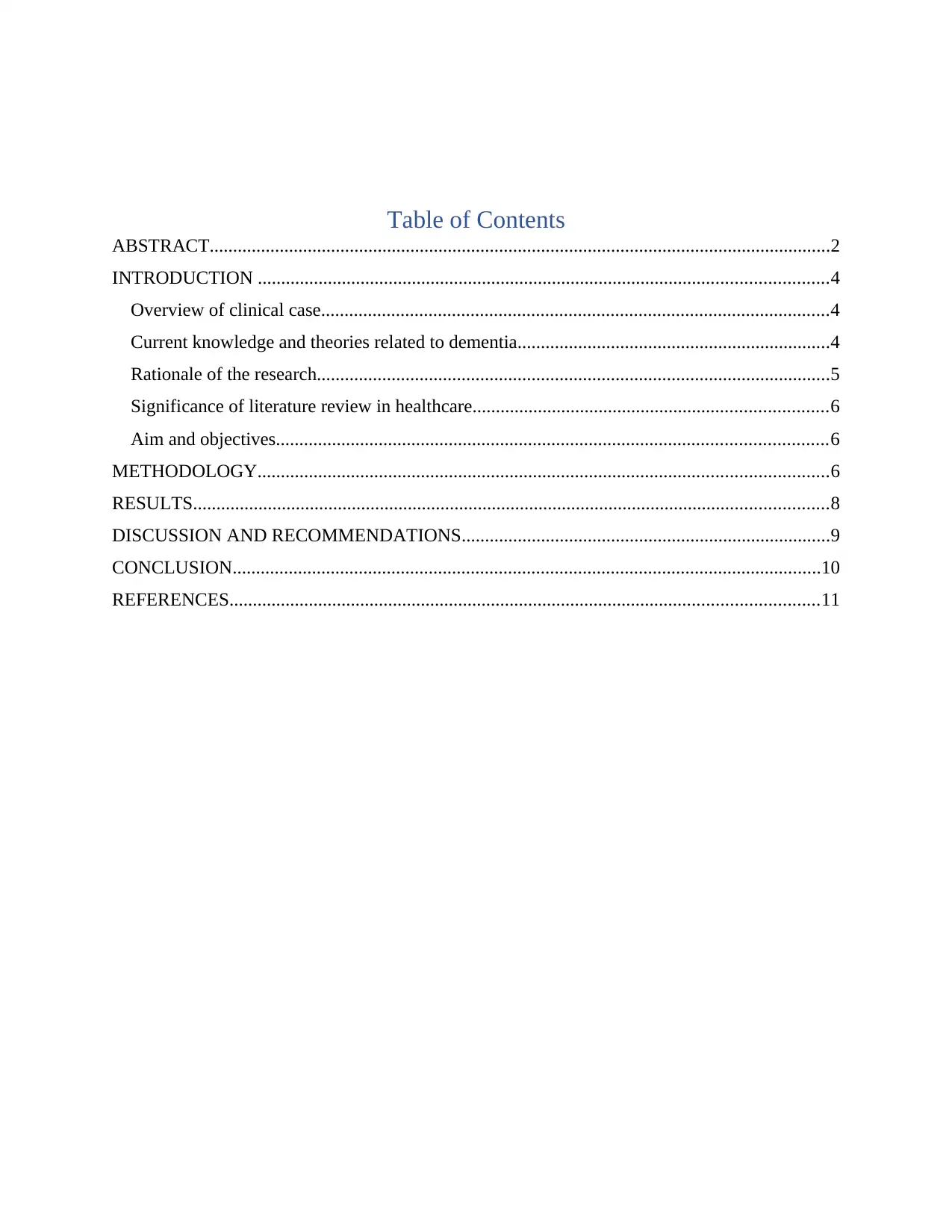
Table of Contents
ABSTRACT.....................................................................................................................................2
INTRODUCTION ..........................................................................................................................4
Overview of clinical case.............................................................................................................4
Current knowledge and theories related to dementia...................................................................4
Rationale of the research..............................................................................................................5
Significance of literature review in healthcare............................................................................6
Aim and objectives......................................................................................................................6
METHODOLOGY..........................................................................................................................6
RESULTS........................................................................................................................................8
DISCUSSION AND RECOMMENDATIONS...............................................................................9
CONCLUSION..............................................................................................................................10
REFERENCES..............................................................................................................................11
ABSTRACT.....................................................................................................................................2
INTRODUCTION ..........................................................................................................................4
Overview of clinical case.............................................................................................................4
Current knowledge and theories related to dementia...................................................................4
Rationale of the research..............................................................................................................5
Significance of literature review in healthcare............................................................................6
Aim and objectives......................................................................................................................6
METHODOLOGY..........................................................................................................................6
RESULTS........................................................................................................................................8
DISCUSSION AND RECOMMENDATIONS...............................................................................9
CONCLUSION..............................................................................................................................10
REFERENCES..............................................................................................................................11
⊘ This is a preview!⊘
Do you want full access?
Subscribe today to unlock all pages.

Trusted by 1+ million students worldwide
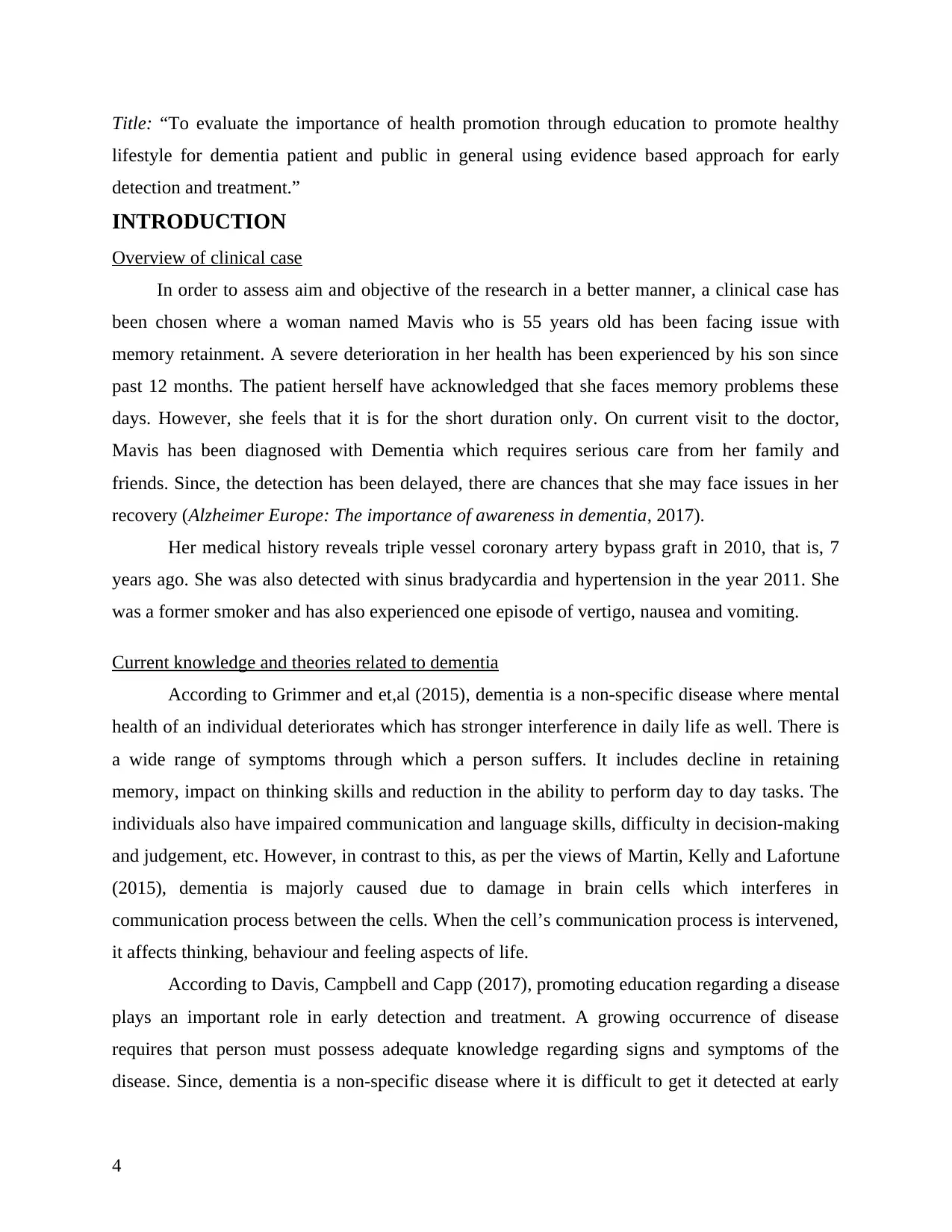
Title: “To evaluate the importance of health promotion through education to promote healthy
lifestyle for dementia patient and public in general using evidence based approach for early
detection and treatment.”
INTRODUCTION
Overview of clinical case
In order to assess aim and objective of the research in a better manner, a clinical case has
been chosen where a woman named Mavis who is 55 years old has been facing issue with
memory retainment. A severe deterioration in her health has been experienced by his son since
past 12 months. The patient herself have acknowledged that she faces memory problems these
days. However, she feels that it is for the short duration only. On current visit to the doctor,
Mavis has been diagnosed with Dementia which requires serious care from her family and
friends. Since, the detection has been delayed, there are chances that she may face issues in her
recovery (Alzheimer Europe: The importance of awareness in dementia, 2017).
Her medical history reveals triple vessel coronary artery bypass graft in 2010, that is, 7
years ago. She was also detected with sinus bradycardia and hypertension in the year 2011. She
was a former smoker and has also experienced one episode of vertigo, nausea and vomiting.
Current knowledge and theories related to dementia
According to Grimmer and et,al (2015), dementia is a non-specific disease where mental
health of an individual deteriorates which has stronger interference in daily life as well. There is
a wide range of symptoms through which a person suffers. It includes decline in retaining
memory, impact on thinking skills and reduction in the ability to perform day to day tasks. The
individuals also have impaired communication and language skills, difficulty in decision-making
and judgement, etc. However, in contrast to this, as per the views of Martin, Kelly and Lafortune
(2015), dementia is majorly caused due to damage in brain cells which interferes in
communication process between the cells. When the cell’s communication process is intervened,
it affects thinking, behaviour and feeling aspects of life.
According to Davis, Campbell and Capp (2017), promoting education regarding a disease
plays an important role in early detection and treatment. A growing occurrence of disease
requires that person must possess adequate knowledge regarding signs and symptoms of the
disease. Since, dementia is a non-specific disease where it is difficult to get it detected at early
4
lifestyle for dementia patient and public in general using evidence based approach for early
detection and treatment.”
INTRODUCTION
Overview of clinical case
In order to assess aim and objective of the research in a better manner, a clinical case has
been chosen where a woman named Mavis who is 55 years old has been facing issue with
memory retainment. A severe deterioration in her health has been experienced by his son since
past 12 months. The patient herself have acknowledged that she faces memory problems these
days. However, she feels that it is for the short duration only. On current visit to the doctor,
Mavis has been diagnosed with Dementia which requires serious care from her family and
friends. Since, the detection has been delayed, there are chances that she may face issues in her
recovery (Alzheimer Europe: The importance of awareness in dementia, 2017).
Her medical history reveals triple vessel coronary artery bypass graft in 2010, that is, 7
years ago. She was also detected with sinus bradycardia and hypertension in the year 2011. She
was a former smoker and has also experienced one episode of vertigo, nausea and vomiting.
Current knowledge and theories related to dementia
According to Grimmer and et,al (2015), dementia is a non-specific disease where mental
health of an individual deteriorates which has stronger interference in daily life as well. There is
a wide range of symptoms through which a person suffers. It includes decline in retaining
memory, impact on thinking skills and reduction in the ability to perform day to day tasks. The
individuals also have impaired communication and language skills, difficulty in decision-making
and judgement, etc. However, in contrast to this, as per the views of Martin, Kelly and Lafortune
(2015), dementia is majorly caused due to damage in brain cells which interferes in
communication process between the cells. When the cell’s communication process is intervened,
it affects thinking, behaviour and feeling aspects of life.
According to Davis, Campbell and Capp (2017), promoting education regarding a disease
plays an important role in early detection and treatment. A growing occurrence of disease
requires that person must possess adequate knowledge regarding signs and symptoms of the
disease. Since, dementia is a non-specific disease where it is difficult to get it detected at early
4
Paraphrase This Document
Need a fresh take? Get an instant paraphrase of this document with our AI Paraphraser
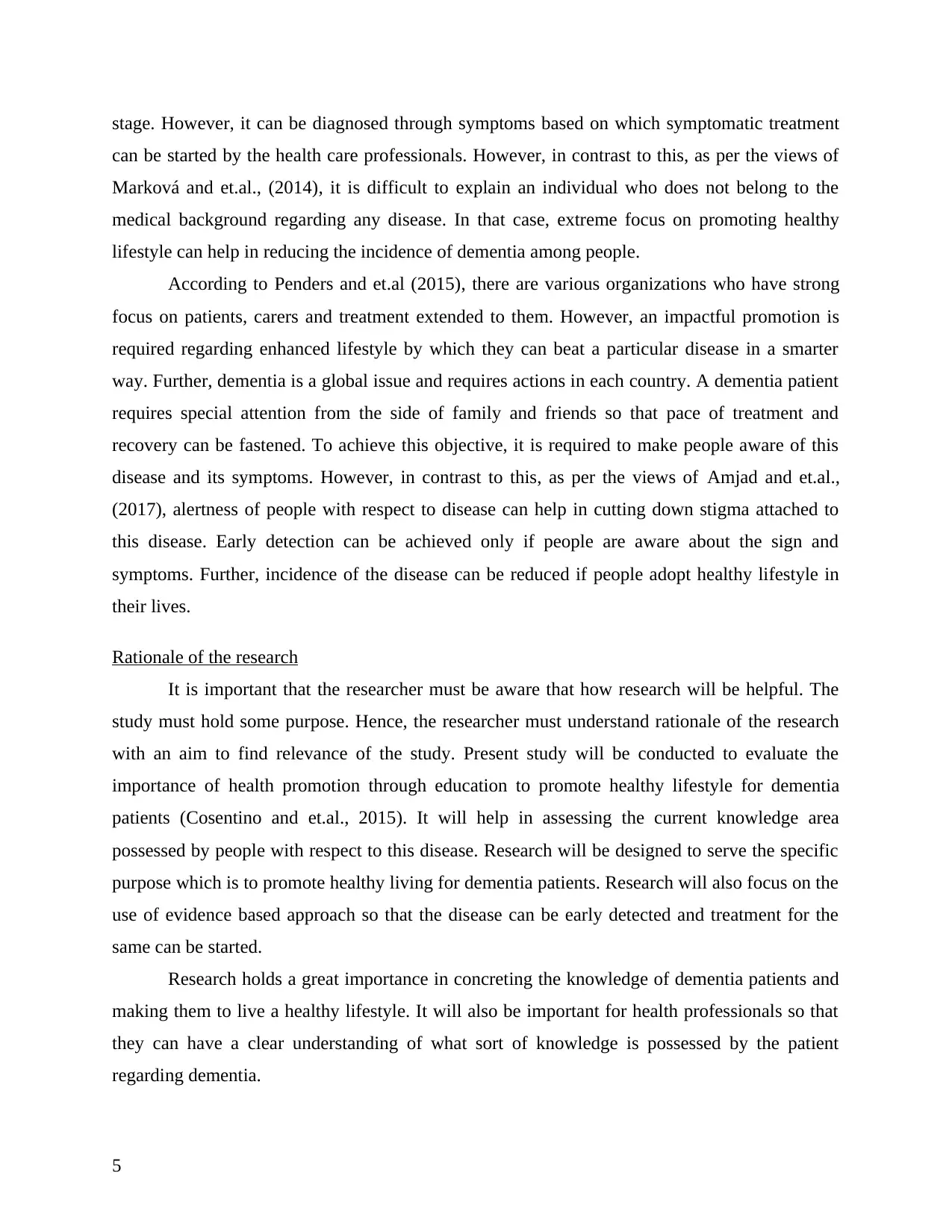
stage. However, it can be diagnosed through symptoms based on which symptomatic treatment
can be started by the health care professionals. However, in contrast to this, as per the views of
Marková and et.al., (2014), it is difficult to explain an individual who does not belong to the
medical background regarding any disease. In that case, extreme focus on promoting healthy
lifestyle can help in reducing the incidence of dementia among people.
According to Penders and et.al (2015), there are various organizations who have strong
focus on patients, carers and treatment extended to them. However, an impactful promotion is
required regarding enhanced lifestyle by which they can beat a particular disease in a smarter
way. Further, dementia is a global issue and requires actions in each country. A dementia patient
requires special attention from the side of family and friends so that pace of treatment and
recovery can be fastened. To achieve this objective, it is required to make people aware of this
disease and its symptoms. However, in contrast to this, as per the views of Amjad and et.al.,
(2017), alertness of people with respect to disease can help in cutting down stigma attached to
this disease. Early detection can be achieved only if people are aware about the sign and
symptoms. Further, incidence of the disease can be reduced if people adopt healthy lifestyle in
their lives.
Rationale of the research
It is important that the researcher must be aware that how research will be helpful. The
study must hold some purpose. Hence, the researcher must understand rationale of the research
with an aim to find relevance of the study. Present study will be conducted to evaluate the
importance of health promotion through education to promote healthy lifestyle for dementia
patients (Cosentino and et.al., 2015). It will help in assessing the current knowledge area
possessed by people with respect to this disease. Research will be designed to serve the specific
purpose which is to promote healthy living for dementia patients. Research will also focus on the
use of evidence based approach so that the disease can be early detected and treatment for the
same can be started.
Research holds a great importance in concreting the knowledge of dementia patients and
making them to live a healthy lifestyle. It will also be important for health professionals so that
they can have a clear understanding of what sort of knowledge is possessed by the patient
regarding dementia.
5
can be started by the health care professionals. However, in contrast to this, as per the views of
Marková and et.al., (2014), it is difficult to explain an individual who does not belong to the
medical background regarding any disease. In that case, extreme focus on promoting healthy
lifestyle can help in reducing the incidence of dementia among people.
According to Penders and et.al (2015), there are various organizations who have strong
focus on patients, carers and treatment extended to them. However, an impactful promotion is
required regarding enhanced lifestyle by which they can beat a particular disease in a smarter
way. Further, dementia is a global issue and requires actions in each country. A dementia patient
requires special attention from the side of family and friends so that pace of treatment and
recovery can be fastened. To achieve this objective, it is required to make people aware of this
disease and its symptoms. However, in contrast to this, as per the views of Amjad and et.al.,
(2017), alertness of people with respect to disease can help in cutting down stigma attached to
this disease. Early detection can be achieved only if people are aware about the sign and
symptoms. Further, incidence of the disease can be reduced if people adopt healthy lifestyle in
their lives.
Rationale of the research
It is important that the researcher must be aware that how research will be helpful. The
study must hold some purpose. Hence, the researcher must understand rationale of the research
with an aim to find relevance of the study. Present study will be conducted to evaluate the
importance of health promotion through education to promote healthy lifestyle for dementia
patients (Cosentino and et.al., 2015). It will help in assessing the current knowledge area
possessed by people with respect to this disease. Research will be designed to serve the specific
purpose which is to promote healthy living for dementia patients. Research will also focus on the
use of evidence based approach so that the disease can be early detected and treatment for the
same can be started.
Research holds a great importance in concreting the knowledge of dementia patients and
making them to live a healthy lifestyle. It will also be important for health professionals so that
they can have a clear understanding of what sort of knowledge is possessed by the patient
regarding dementia.
5
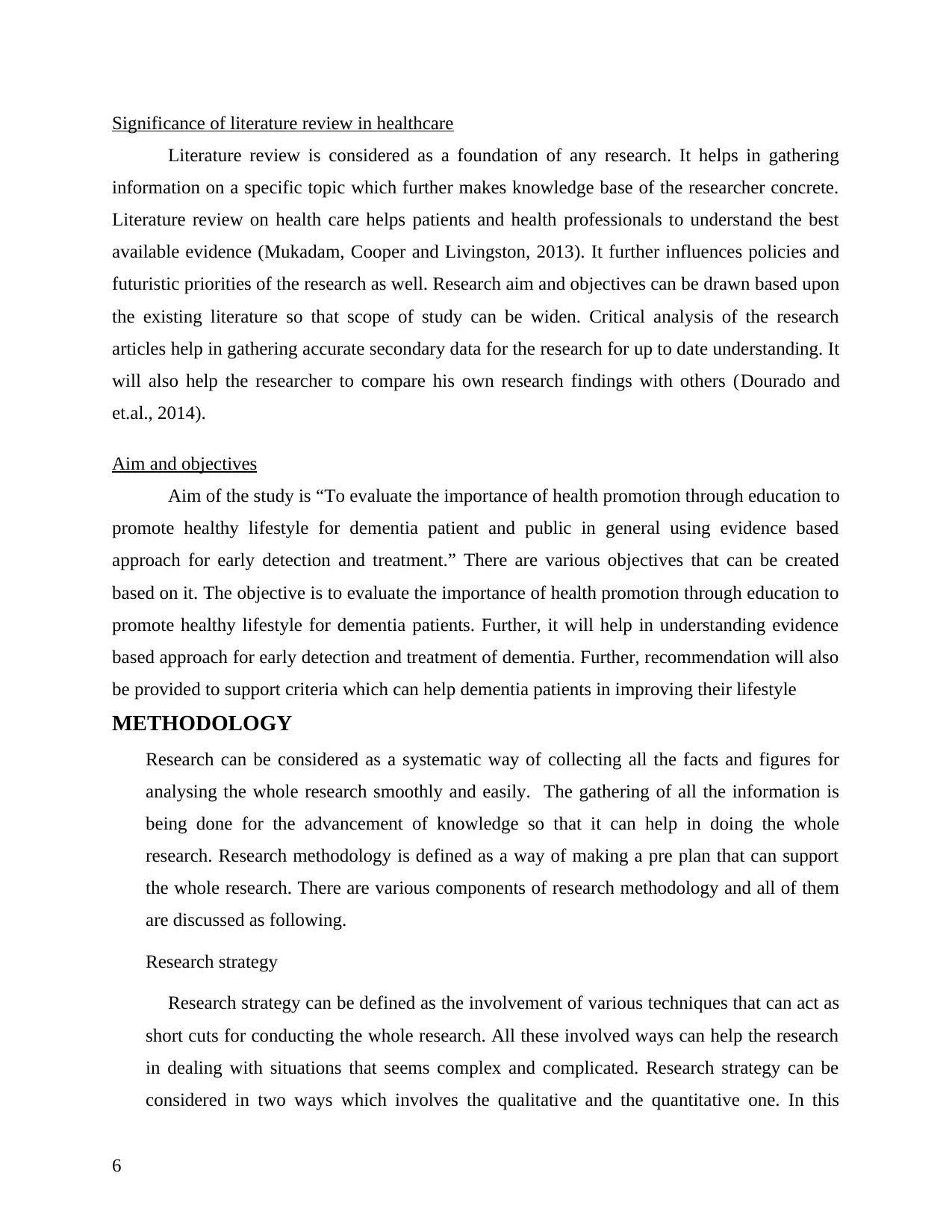
Significance of literature review in healthcare
Literature review is considered as a foundation of any research. It helps in gathering
information on a specific topic which further makes knowledge base of the researcher concrete.
Literature review on health care helps patients and health professionals to understand the best
available evidence (Mukadam, Cooper and Livingston, 2013). It further influences policies and
futuristic priorities of the research as well. Research aim and objectives can be drawn based upon
the existing literature so that scope of study can be widen. Critical analysis of the research
articles help in gathering accurate secondary data for the research for up to date understanding. It
will also help the researcher to compare his own research findings with others (Dourado and
et.al., 2014).
Aim and objectives
Aim of the study is “To evaluate the importance of health promotion through education to
promote healthy lifestyle for dementia patient and public in general using evidence based
approach for early detection and treatment.” There are various objectives that can be created
based on it. The objective is to evaluate the importance of health promotion through education to
promote healthy lifestyle for dementia patients. Further, it will help in understanding evidence
based approach for early detection and treatment of dementia. Further, recommendation will also
be provided to support criteria which can help dementia patients in improving their lifestyle
METHODOLOGY
Research can be considered as a systematic way of collecting all the facts and figures for
analysing the whole research smoothly and easily. The gathering of all the information is
being done for the advancement of knowledge so that it can help in doing the whole
research. Research methodology is defined as a way of making a pre plan that can support
the whole research. There are various components of research methodology and all of them
are discussed as following.
Research strategy
Research strategy can be defined as the involvement of various techniques that can act as
short cuts for conducting the whole research. All these involved ways can help the research
in dealing with situations that seems complex and complicated. Research strategy can be
considered in two ways which involves the qualitative and the quantitative one. In this
6
Literature review is considered as a foundation of any research. It helps in gathering
information on a specific topic which further makes knowledge base of the researcher concrete.
Literature review on health care helps patients and health professionals to understand the best
available evidence (Mukadam, Cooper and Livingston, 2013). It further influences policies and
futuristic priorities of the research as well. Research aim and objectives can be drawn based upon
the existing literature so that scope of study can be widen. Critical analysis of the research
articles help in gathering accurate secondary data for the research for up to date understanding. It
will also help the researcher to compare his own research findings with others (Dourado and
et.al., 2014).
Aim and objectives
Aim of the study is “To evaluate the importance of health promotion through education to
promote healthy lifestyle for dementia patient and public in general using evidence based
approach for early detection and treatment.” There are various objectives that can be created
based on it. The objective is to evaluate the importance of health promotion through education to
promote healthy lifestyle for dementia patients. Further, it will help in understanding evidence
based approach for early detection and treatment of dementia. Further, recommendation will also
be provided to support criteria which can help dementia patients in improving their lifestyle
METHODOLOGY
Research can be considered as a systematic way of collecting all the facts and figures for
analysing the whole research smoothly and easily. The gathering of all the information is
being done for the advancement of knowledge so that it can help in doing the whole
research. Research methodology is defined as a way of making a pre plan that can support
the whole research. There are various components of research methodology and all of them
are discussed as following.
Research strategy
Research strategy can be defined as the involvement of various techniques that can act as
short cuts for conducting the whole research. All these involved ways can help the research
in dealing with situations that seems complex and complicated. Research strategy can be
considered in two ways which involves the qualitative and the quantitative one. In this
6
⊘ This is a preview!⊘
Do you want full access?
Subscribe today to unlock all pages.

Trusted by 1+ million students worldwide
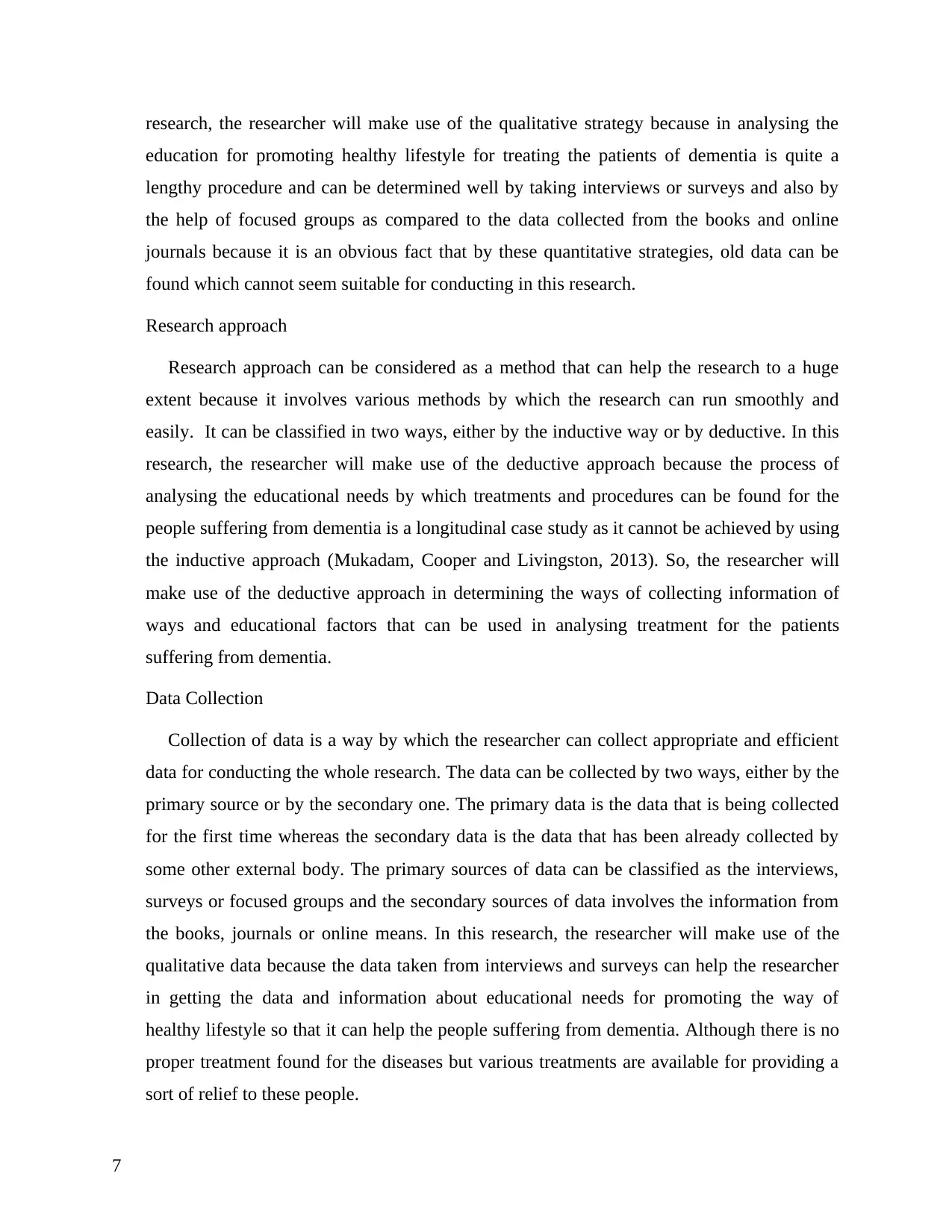
research, the researcher will make use of the qualitative strategy because in analysing the
education for promoting healthy lifestyle for treating the patients of dementia is quite a
lengthy procedure and can be determined well by taking interviews or surveys and also by
the help of focused groups as compared to the data collected from the books and online
journals because it is an obvious fact that by these quantitative strategies, old data can be
found which cannot seem suitable for conducting in this research.
Research approach
Research approach can be considered as a method that can help the research to a huge
extent because it involves various methods by which the research can run smoothly and
easily. It can be classified in two ways, either by the inductive way or by deductive. In this
research, the researcher will make use of the deductive approach because the process of
analysing the educational needs by which treatments and procedures can be found for the
people suffering from dementia is a longitudinal case study as it cannot be achieved by using
the inductive approach (Mukadam, Cooper and Livingston, 2013). So, the researcher will
make use of the deductive approach in determining the ways of collecting information of
ways and educational factors that can be used in analysing treatment for the patients
suffering from dementia.
Data Collection
Collection of data is a way by which the researcher can collect appropriate and efficient
data for conducting the whole research. The data can be collected by two ways, either by the
primary source or by the secondary one. The primary data is the data that is being collected
for the first time whereas the secondary data is the data that has been already collected by
some other external body. The primary sources of data can be classified as the interviews,
surveys or focused groups and the secondary sources of data involves the information from
the books, journals or online means. In this research, the researcher will make use of the
qualitative data because the data taken from interviews and surveys can help the researcher
in getting the data and information about educational needs for promoting the way of
healthy lifestyle so that it can help the people suffering from dementia. Although there is no
proper treatment found for the diseases but various treatments are available for providing a
sort of relief to these people.
7
education for promoting healthy lifestyle for treating the patients of dementia is quite a
lengthy procedure and can be determined well by taking interviews or surveys and also by
the help of focused groups as compared to the data collected from the books and online
journals because it is an obvious fact that by these quantitative strategies, old data can be
found which cannot seem suitable for conducting in this research.
Research approach
Research approach can be considered as a method that can help the research to a huge
extent because it involves various methods by which the research can run smoothly and
easily. It can be classified in two ways, either by the inductive way or by deductive. In this
research, the researcher will make use of the deductive approach because the process of
analysing the educational needs by which treatments and procedures can be found for the
people suffering from dementia is a longitudinal case study as it cannot be achieved by using
the inductive approach (Mukadam, Cooper and Livingston, 2013). So, the researcher will
make use of the deductive approach in determining the ways of collecting information of
ways and educational factors that can be used in analysing treatment for the patients
suffering from dementia.
Data Collection
Collection of data is a way by which the researcher can collect appropriate and efficient
data for conducting the whole research. The data can be collected by two ways, either by the
primary source or by the secondary one. The primary data is the data that is being collected
for the first time whereas the secondary data is the data that has been already collected by
some other external body. The primary sources of data can be classified as the interviews,
surveys or focused groups and the secondary sources of data involves the information from
the books, journals or online means. In this research, the researcher will make use of the
qualitative data because the data taken from interviews and surveys can help the researcher
in getting the data and information about educational needs for promoting the way of
healthy lifestyle so that it can help the people suffering from dementia. Although there is no
proper treatment found for the diseases but various treatments are available for providing a
sort of relief to these people.
7
Paraphrase This Document
Need a fresh take? Get an instant paraphrase of this document with our AI Paraphraser
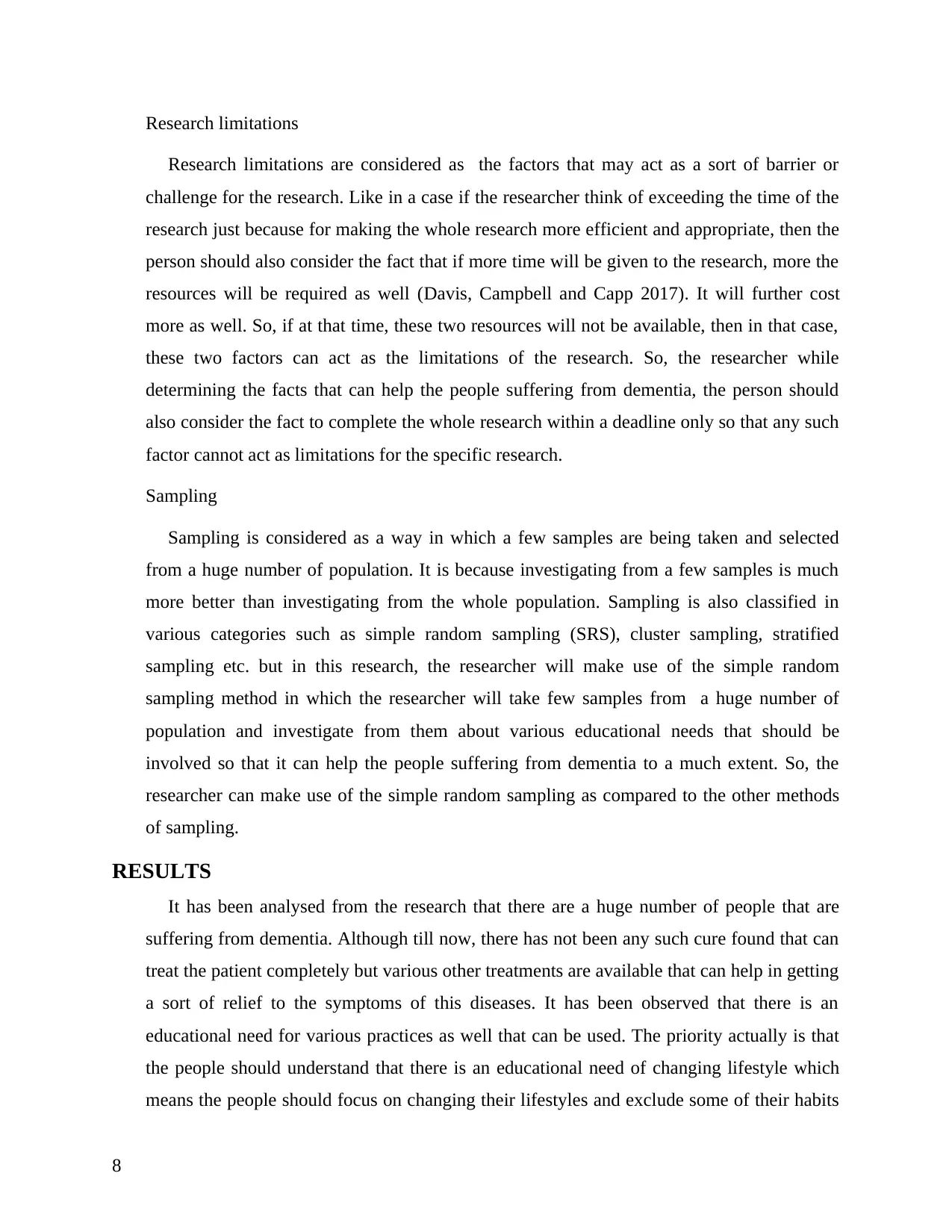
Research limitations
Research limitations are considered as the factors that may act as a sort of barrier or
challenge for the research. Like in a case if the researcher think of exceeding the time of the
research just because for making the whole research more efficient and appropriate, then the
person should also consider the fact that if more time will be given to the research, more the
resources will be required as well (Davis, Campbell and Capp 2017). It will further cost
more as well. So, if at that time, these two resources will not be available, then in that case,
these two factors can act as the limitations of the research. So, the researcher while
determining the facts that can help the people suffering from dementia, the person should
also consider the fact to complete the whole research within a deadline only so that any such
factor cannot act as limitations for the specific research.
Sampling
Sampling is considered as a way in which a few samples are being taken and selected
from a huge number of population. It is because investigating from a few samples is much
more better than investigating from the whole population. Sampling is also classified in
various categories such as simple random sampling (SRS), cluster sampling, stratified
sampling etc. but in this research, the researcher will make use of the simple random
sampling method in which the researcher will take few samples from a huge number of
population and investigate from them about various educational needs that should be
involved so that it can help the people suffering from dementia to a much extent. So, the
researcher can make use of the simple random sampling as compared to the other methods
of sampling.
RESULTS
It has been analysed from the research that there are a huge number of people that are
suffering from dementia. Although till now, there has not been any such cure found that can
treat the patient completely but various other treatments are available that can help in getting
a sort of relief to the symptoms of this diseases. It has been observed that there is an
educational need for various practices as well that can be used. The priority actually is that
the people should understand that there is an educational need of changing lifestyle which
means the people should focus on changing their lifestyles and exclude some of their habits
8
Research limitations are considered as the factors that may act as a sort of barrier or
challenge for the research. Like in a case if the researcher think of exceeding the time of the
research just because for making the whole research more efficient and appropriate, then the
person should also consider the fact that if more time will be given to the research, more the
resources will be required as well (Davis, Campbell and Capp 2017). It will further cost
more as well. So, if at that time, these two resources will not be available, then in that case,
these two factors can act as the limitations of the research. So, the researcher while
determining the facts that can help the people suffering from dementia, the person should
also consider the fact to complete the whole research within a deadline only so that any such
factor cannot act as limitations for the specific research.
Sampling
Sampling is considered as a way in which a few samples are being taken and selected
from a huge number of population. It is because investigating from a few samples is much
more better than investigating from the whole population. Sampling is also classified in
various categories such as simple random sampling (SRS), cluster sampling, stratified
sampling etc. but in this research, the researcher will make use of the simple random
sampling method in which the researcher will take few samples from a huge number of
population and investigate from them about various educational needs that should be
involved so that it can help the people suffering from dementia to a much extent. So, the
researcher can make use of the simple random sampling as compared to the other methods
of sampling.
RESULTS
It has been analysed from the research that there are a huge number of people that are
suffering from dementia. Although till now, there has not been any such cure found that can
treat the patient completely but various other treatments are available that can help in getting
a sort of relief to the symptoms of this diseases. It has been observed that there is an
educational need for various practices as well that can be used. The priority actually is that
the people should understand that there is an educational need of changing lifestyle which
means the people should focus on changing their lifestyles and exclude some of their habits
8
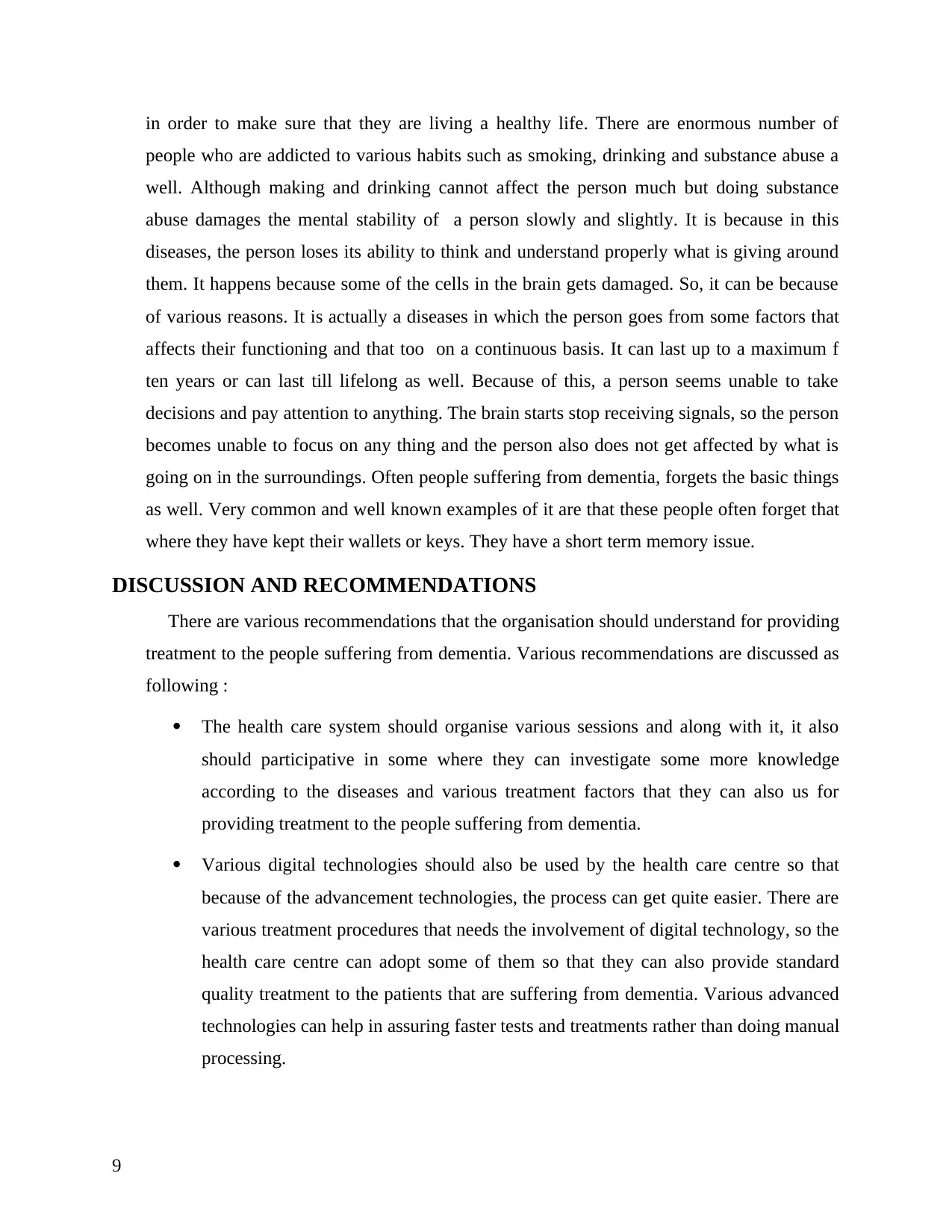
in order to make sure that they are living a healthy life. There are enormous number of
people who are addicted to various habits such as smoking, drinking and substance abuse a
well. Although making and drinking cannot affect the person much but doing substance
abuse damages the mental stability of a person slowly and slightly. It is because in this
diseases, the person loses its ability to think and understand properly what is giving around
them. It happens because some of the cells in the brain gets damaged. So, it can be because
of various reasons. It is actually a diseases in which the person goes from some factors that
affects their functioning and that too on a continuous basis. It can last up to a maximum f
ten years or can last till lifelong as well. Because of this, a person seems unable to take
decisions and pay attention to anything. The brain starts stop receiving signals, so the person
becomes unable to focus on any thing and the person also does not get affected by what is
going on in the surroundings. Often people suffering from dementia, forgets the basic things
as well. Very common and well known examples of it are that these people often forget that
where they have kept their wallets or keys. They have a short term memory issue.
DISCUSSION AND RECOMMENDATIONS
There are various recommendations that the organisation should understand for providing
treatment to the people suffering from dementia. Various recommendations are discussed as
following :
The health care system should organise various sessions and along with it, it also
should participative in some where they can investigate some more knowledge
according to the diseases and various treatment factors that they can also us for
providing treatment to the people suffering from dementia.
Various digital technologies should also be used by the health care centre so that
because of the advancement technologies, the process can get quite easier. There are
various treatment procedures that needs the involvement of digital technology, so the
health care centre can adopt some of them so that they can also provide standard
quality treatment to the patients that are suffering from dementia. Various advanced
technologies can help in assuring faster tests and treatments rather than doing manual
processing.
9
people who are addicted to various habits such as smoking, drinking and substance abuse a
well. Although making and drinking cannot affect the person much but doing substance
abuse damages the mental stability of a person slowly and slightly. It is because in this
diseases, the person loses its ability to think and understand properly what is giving around
them. It happens because some of the cells in the brain gets damaged. So, it can be because
of various reasons. It is actually a diseases in which the person goes from some factors that
affects their functioning and that too on a continuous basis. It can last up to a maximum f
ten years or can last till lifelong as well. Because of this, a person seems unable to take
decisions and pay attention to anything. The brain starts stop receiving signals, so the person
becomes unable to focus on any thing and the person also does not get affected by what is
going on in the surroundings. Often people suffering from dementia, forgets the basic things
as well. Very common and well known examples of it are that these people often forget that
where they have kept their wallets or keys. They have a short term memory issue.
DISCUSSION AND RECOMMENDATIONS
There are various recommendations that the organisation should understand for providing
treatment to the people suffering from dementia. Various recommendations are discussed as
following :
The health care system should organise various sessions and along with it, it also
should participative in some where they can investigate some more knowledge
according to the diseases and various treatment factors that they can also us for
providing treatment to the people suffering from dementia.
Various digital technologies should also be used by the health care centre so that
because of the advancement technologies, the process can get quite easier. There are
various treatment procedures that needs the involvement of digital technology, so the
health care centre can adopt some of them so that they can also provide standard
quality treatment to the patients that are suffering from dementia. Various advanced
technologies can help in assuring faster tests and treatments rather than doing manual
processing.
9
⊘ This is a preview!⊘
Do you want full access?
Subscribe today to unlock all pages.

Trusted by 1+ million students worldwide
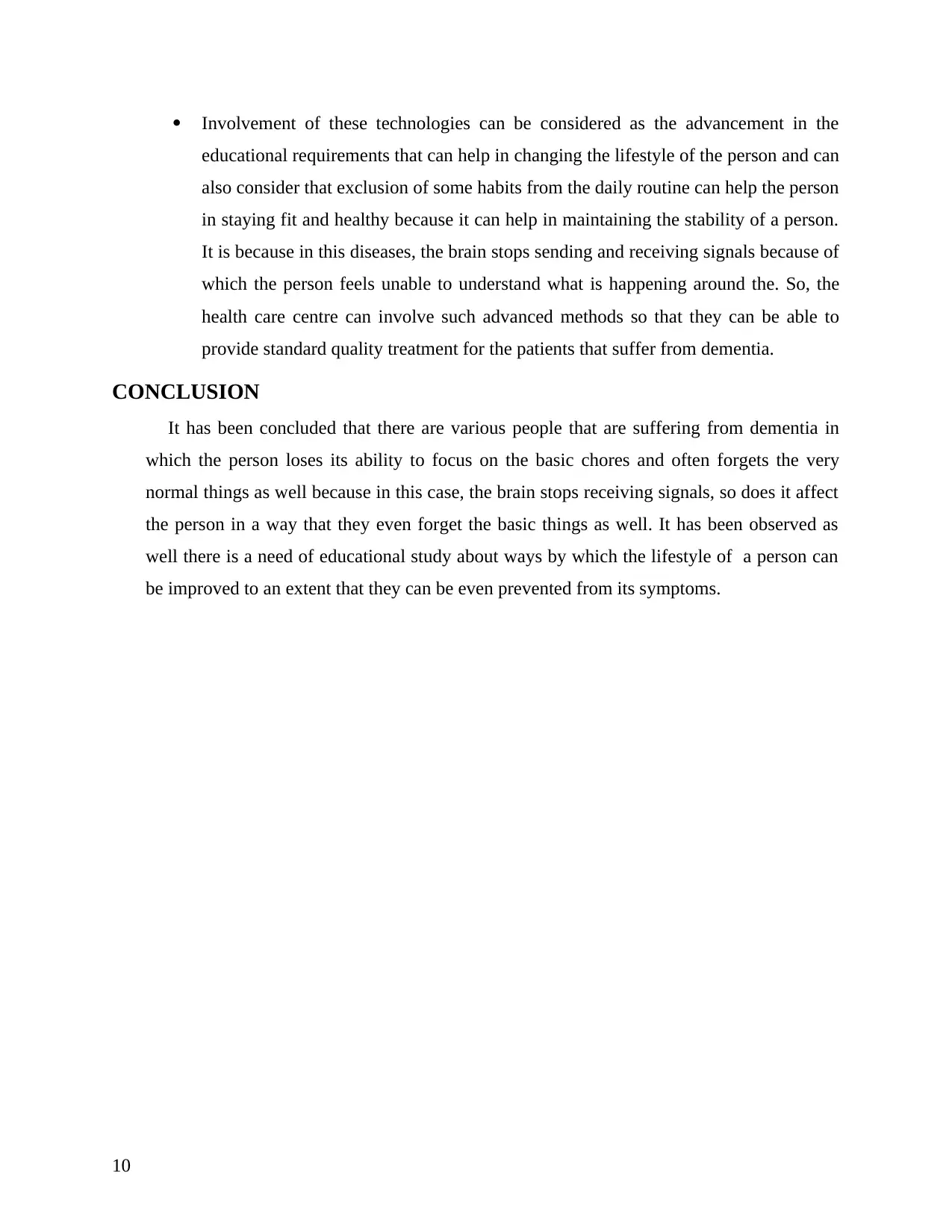
Involvement of these technologies can be considered as the advancement in the
educational requirements that can help in changing the lifestyle of the person and can
also consider that exclusion of some habits from the daily routine can help the person
in staying fit and healthy because it can help in maintaining the stability of a person.
It is because in this diseases, the brain stops sending and receiving signals because of
which the person feels unable to understand what is happening around the. So, the
health care centre can involve such advanced methods so that they can be able to
provide standard quality treatment for the patients that suffer from dementia.
CONCLUSION
It has been concluded that there are various people that are suffering from dementia in
which the person loses its ability to focus on the basic chores and often forgets the very
normal things as well because in this case, the brain stops receiving signals, so does it affect
the person in a way that they even forget the basic things as well. It has been observed as
well there is a need of educational study about ways by which the lifestyle of a person can
be improved to an extent that they can be even prevented from its symptoms.
10
educational requirements that can help in changing the lifestyle of the person and can
also consider that exclusion of some habits from the daily routine can help the person
in staying fit and healthy because it can help in maintaining the stability of a person.
It is because in this diseases, the brain stops sending and receiving signals because of
which the person feels unable to understand what is happening around the. So, the
health care centre can involve such advanced methods so that they can be able to
provide standard quality treatment for the patients that suffer from dementia.
CONCLUSION
It has been concluded that there are various people that are suffering from dementia in
which the person loses its ability to focus on the basic chores and often forgets the very
normal things as well because in this case, the brain stops receiving signals, so does it affect
the person in a way that they even forget the basic things as well. It has been observed as
well there is a need of educational study about ways by which the lifestyle of a person can
be improved to an extent that they can be even prevented from its symptoms.
10
Paraphrase This Document
Need a fresh take? Get an instant paraphrase of this document with our AI Paraphraser
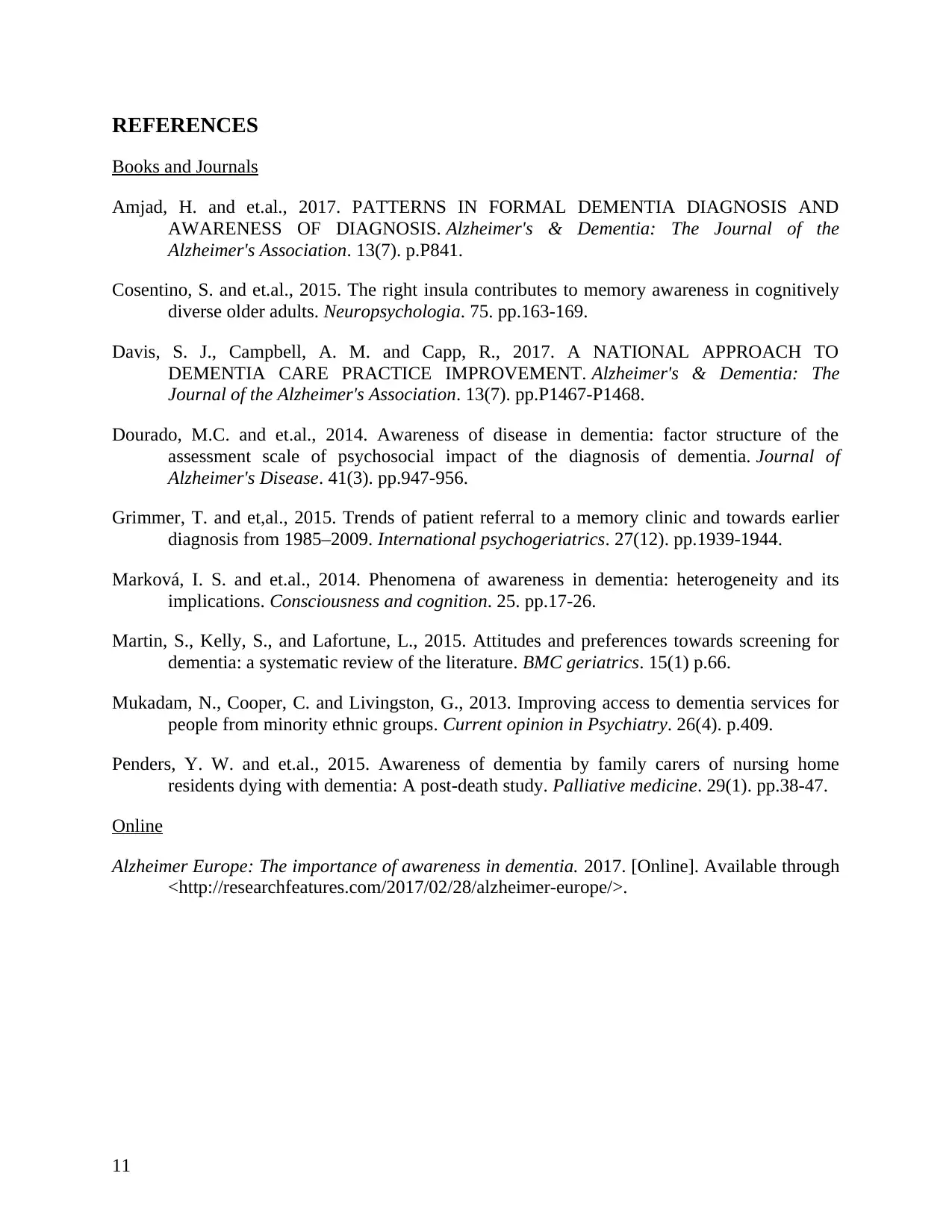
REFERENCES
Books and Journals
Amjad, H. and et.al., 2017. PATTERNS IN FORMAL DEMENTIA DIAGNOSIS AND
AWARENESS OF DIAGNOSIS. Alzheimer's & Dementia: The Journal of the
Alzheimer's Association. 13(7). p.P841.
Cosentino, S. and et.al., 2015. The right insula contributes to memory awareness in cognitively
diverse older adults. Neuropsychologia. 75. pp.163-169.
Davis, S. J., Campbell, A. M. and Capp, R., 2017. A NATIONAL APPROACH TO
DEMENTIA CARE PRACTICE IMPROVEMENT. Alzheimer's & Dementia: The
Journal of the Alzheimer's Association. 13(7). pp.P1467-P1468.
Dourado, M.C. and et.al., 2014. Awareness of disease in dementia: factor structure of the
assessment scale of psychosocial impact of the diagnosis of dementia. Journal of
Alzheimer's Disease. 41(3). pp.947-956.
Grimmer, T. and et,al., 2015. Trends of patient referral to a memory clinic and towards earlier
diagnosis from 1985–2009. International psychogeriatrics. 27(12). pp.1939-1944.
Marková, I. S. and et.al., 2014. Phenomena of awareness in dementia: heterogeneity and its
implications. Consciousness and cognition. 25. pp.17-26.
Martin, S., Kelly, S., and Lafortune, L., 2015. Attitudes and preferences towards screening for
dementia: a systematic review of the literature. BMC geriatrics. 15(1) p.66.
Mukadam, N., Cooper, C. and Livingston, G., 2013. Improving access to dementia services for
people from minority ethnic groups. Current opinion in Psychiatry. 26(4). p.409.
Penders, Y. W. and et.al., 2015. Awareness of dementia by family carers of nursing home
residents dying with dementia: A post-death study. Palliative medicine. 29(1). pp.38-47.
Online
Alzheimer Europe: The importance of awareness in dementia. 2017. [Online]. Available through
<http://researchfeatures.com/2017/02/28/alzheimer-europe/>.
11
Books and Journals
Amjad, H. and et.al., 2017. PATTERNS IN FORMAL DEMENTIA DIAGNOSIS AND
AWARENESS OF DIAGNOSIS. Alzheimer's & Dementia: The Journal of the
Alzheimer's Association. 13(7). p.P841.
Cosentino, S. and et.al., 2015. The right insula contributes to memory awareness in cognitively
diverse older adults. Neuropsychologia. 75. pp.163-169.
Davis, S. J., Campbell, A. M. and Capp, R., 2017. A NATIONAL APPROACH TO
DEMENTIA CARE PRACTICE IMPROVEMENT. Alzheimer's & Dementia: The
Journal of the Alzheimer's Association. 13(7). pp.P1467-P1468.
Dourado, M.C. and et.al., 2014. Awareness of disease in dementia: factor structure of the
assessment scale of psychosocial impact of the diagnosis of dementia. Journal of
Alzheimer's Disease. 41(3). pp.947-956.
Grimmer, T. and et,al., 2015. Trends of patient referral to a memory clinic and towards earlier
diagnosis from 1985–2009. International psychogeriatrics. 27(12). pp.1939-1944.
Marková, I. S. and et.al., 2014. Phenomena of awareness in dementia: heterogeneity and its
implications. Consciousness and cognition. 25. pp.17-26.
Martin, S., Kelly, S., and Lafortune, L., 2015. Attitudes and preferences towards screening for
dementia: a systematic review of the literature. BMC geriatrics. 15(1) p.66.
Mukadam, N., Cooper, C. and Livingston, G., 2013. Improving access to dementia services for
people from minority ethnic groups. Current opinion in Psychiatry. 26(4). p.409.
Penders, Y. W. and et.al., 2015. Awareness of dementia by family carers of nursing home
residents dying with dementia: A post-death study. Palliative medicine. 29(1). pp.38-47.
Online
Alzheimer Europe: The importance of awareness in dementia. 2017. [Online]. Available through
<http://researchfeatures.com/2017/02/28/alzheimer-europe/>.
11
1 out of 11
Related Documents
Your All-in-One AI-Powered Toolkit for Academic Success.
+13062052269
info@desklib.com
Available 24*7 on WhatsApp / Email
![[object Object]](/_next/static/media/star-bottom.7253800d.svg)
Unlock your academic potential
Copyright © 2020–2026 A2Z Services. All Rights Reserved. Developed and managed by ZUCOL.





